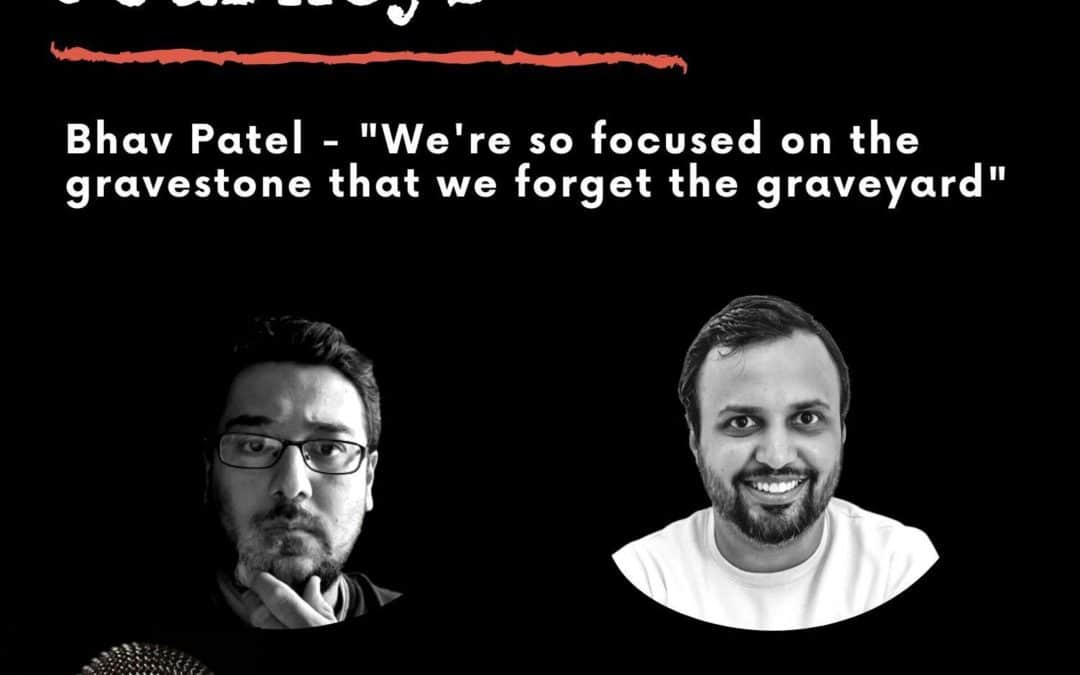This is the Leadership Journey series on the Choosing Leadership Podcast.
I believe we all have a lot to learn from each other’s stories – of where we started, where we are now, and our successes and struggles on the way. With this series of interviews, my attempt is to give leaders an opportunity to share their stories and for all of us to learn from their generous sharing.
In the interview, Bhav shares not just his leadership style but also the madman part of him. He talks about the incredible role luck plays in our journeys, and how he uses drawing to bring a deep focus to his work – and how that helps him stay balanced as a leader.
You can find Bhav at the below links
In the interview, Bhav shares
- I’ve always put a lot of my journey down to luck. Like just having been at the right place at the right time with the right manager who was able to guide me into the role.
- I certainly try to think about decisions I make that impact the company that impacts the team. Just like the bigger picture, as opposed to always just focusing on the team.
- I talk about this with my team constantly when we have career development conversations generally. What gives you energy? Like, what is it that gets you up? What do you enjoy?
- Energy is like a balance. There’s gonna be things that give you energy and things that drain you on an adventure.
- A large part of like my early influence has always been maths, science, and believe it or not, art. I feel like between those three subjects, you kind of get to see the world with different lenses. So from the math and science perspective, you get to see the world from a very quantitative matter-of-fact, point of view, then from art, you kind of have this very abstract interpretation of what things mean and how people interpret them.
- Everyone’s different. And people react to situations very differently.
- I like to paint and draw when I’m not working. Obviously I’ve got two kids, which means that my free time is limited and precious. Sitting down and painting or drawing helps me take my mind off things and just focus on being in the moment.
- When I focus, I can, I’ll put myself into almost a meditative state where it’s nothing but the problem I’m working on.
- I’ll split my week between like being really close to the problems and what my team working on, but also then taking a huge step back to actually, are we as a team heading on the right track?
- If you don’t want to be misinterpreted or you want to get to some outcome. You have to recognize who you’re speaking to. Adopt and adapt the way you talk to their style.
- If you adopt the right style for your audience. You at least minimize the risk of something being lost in translation.
- I think there is this distinct lack of training in all organizations, even in education, which prepares people for these non-technical skills. That’s also critical as you progress into leadership positions.
- We communicate in so many different ways that people sometimes forget.
- If I’m being completely honest. I don’t know what the answer is, what the future holds.
- I use the expression we’re so focused on the gravestone. We forget the graveyard.
- It’s easy to be a good leader when things are looking great. It’s only when you know, you’re staring down the barrel of a gun and you have to make like big decisions and know, you have to prioritize ruthlessly and you have to, you’re going to disappoint people that actually your skills as a leader and your authenticity and your concept communications, they really started to show themselves in you your true character is revealed.
- I’ve said it before and I’ll say again, I think people often forget. Yes, of course you’ve earned your right to be, uh in a position of leadership, but there’s an incredible amount of luck for every person who makes it into a management position, probably like 10X who don’t.
- It took me a while to recognize that I can’t solve every problem. I can’t, I’m not supposed to. I’m supposed to be the advocate. I’m supposed to have the hard conversations when I need to. I need to motivate them when I need to. I need to praise them.
- All of the skills that got me into this position are not going to be the skillset that will make me successful moving forward.
- I think having a network of peers, people who are at the same level as you don’t have to be in your discipline, Talking to them, understanding what the challenges are, reaching out to people, and understanding what you need to develop a service mindset sooner. It’s going to be super helpful.

